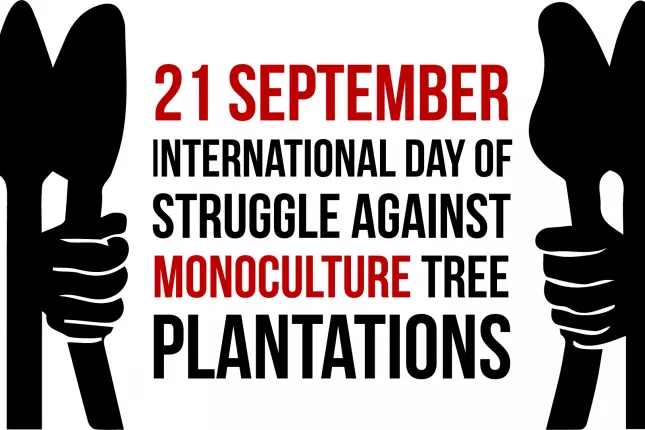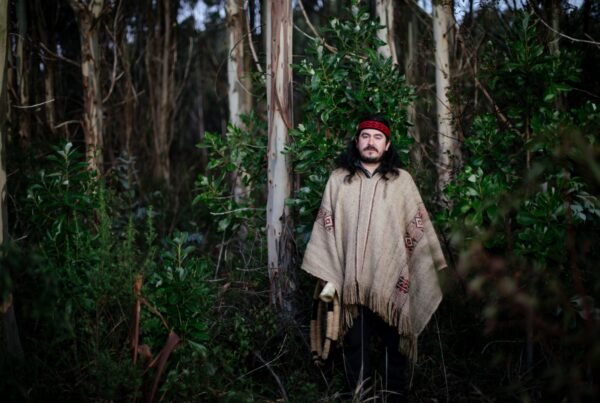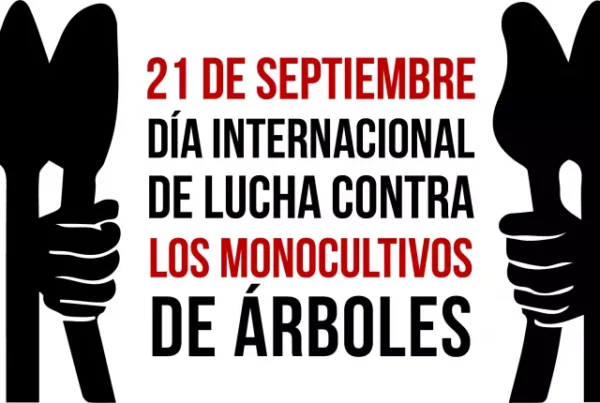By Marien Gonzalez Hidalgo, in conversation with Joám Evans Pim and Pablo Reyes Huenchumán.
This week marks the international day of struggle against monoculture tree plantations. In 2004, 21 September was declared as the day when organisations, communities and movements celebrate resistance and raise their voices to demand a halt to the expansion of industrial tree plantations. The day was declared during a meeting of a community network fighting against industrial tree plantations in Brazil. September 21 was chosen because Brazil celebrates Arbor Day (Dia da Arvore) on that date.
In solidarity with the daily resistance of local communities facing the expansion of these monocultures, Undisciplined Environments publishes two interviews (in English and Spanish) with two activists and leaders of resistance movements in their respective territories. Below, the first interview is with Joám Evans Pim, an activist leading a de-eucalyptisation movement in the Galician communal forests. In the second interview, which will be published in September 21st, we talk to Pablo Reyes Huenchumán, a Mapuche activist and leader recovering territory occupied by a large forestry company in the Mapuche territory in Chile. Despite the huge differences among the territories and movements, both are connected by the imposition of a capitalist and colonial model based on forestry extraction, over the rights and needs of human and non-human communities. And, also, the two territories are connected by the presence of grassroots communities that, like many others, seek to exercise forest sovereignty: where territory, communitarian decisions, history and dignity have space beyond the advance of green capitalism.

International Day of Struggle Against Monoculture Tree Plantations. Source: wrm.org.uy
Interview with Joám Evans Pim: Exercising forest sovereignty from Froxán, Galicia.
We talk with Joám Evans Pim, a resident of Froxán (Lousame, Galicia), where the project “De-eucalyptising Brigades” began in 2018. We chat about the implications of tree monocultures at a territorial level, and about the alternatives generated through grassroots struggles.
Since 2004, the “International Day of Struggle against Monoculture Tree Plantations” has been celebrated on 21 September, with the intention of denouncing, at least once a year, how large-scale industrial tree production threatens the sovereignty of communities and peoples. What would you say are the main impacts of the plantation-based forestry model on your territory?
JEP: In Galicia, eucalyptus monocultures already occupy half a million hectares, a third of the country’s woodland, a figure that is constantly increasing. These plantations, intended to produce low-cost wood for the paper industry, displace native forests, illegally occupy agricultural land for cultivation or extensive livestock farming, and threaten the integrity and well-being of communities by increasing the risk of fires, affecting springs and destroying our identity, which is intimately linked to our ancestral landscape. For a long time, eucalyptus monocultures applied chemical weedkillers, creating toxic wastelands in which soils have practically disappeared due to the dragging and which, in the face of climate change, represent a first step towards desertification.
From your point of view, what factors motivate/help to maintain the plantation-based forestry model?
JEP: In the 1950s, General Franco’s dictatorship decided to set up a pulp mill in Galicia, in the Pontevedra estuary. The establishment of the Empresa Nacional de Celulosas (ENCE) generated an ever-increasing demand for raw material, in a context of usurpation by the fascist state of the forests held in common by the communities, through the Patrimonio Forestal del Estado (State Forestry Patrimony). The forced reforestation of the dictatorship left behind a landscape that had little to do with the previous agro-silvo-pastoral system, and ENCE became the most important lobby that conditions the decisions on forestry and rural policy today. This is illustrated, for example, by the refusal of both the Spanish government in Madrid and the Supreme Court to include eucalyptus in the catalogue of invasive alien species, despite the strong opinion of the Scientific Committee of the Ministry for Ecological Transition that indicated the need to list it as such.
On the other hand, at the social level, an imaginary that correlates eucalyptus with progress and easy money has been fostered for decades, leading many small landowners to continue planting eucalyptus even in circumstances where profitability is negative (very small plot sizes, steep and inaccessible land, etc.), so that in practice they are subsidising eucalyptus production with their own savings, and not the other way around.
Finally, the demographic decline of rural areas, with emigration to cities and abroad, encourages abandonment and the phenomenon of absentee owners, which either through the spontaneous expansion of eucalyptus trees after fires or through the planting by these owners, encourages the exponential increase of the surface occupied by eucalyptus in the territory.

Collective work to eliminate eucalyptus trees. Source: Brigadas deseucaliptizadoras.
This day is not only to denounce the impacts, but also to make visible the daily resistance of the communities affected by tree plantations. How do you organise to confront the implications of this model and gain spaces of sovereignty?
Rural communities face the risk of fires every summer, generating enormous anxiety and a permanent risk caused by plantations that only really benefit big industry. In Froxán there was a devastating fire in 2006 and in 2016 it was repeated in similar conditions (in the latter case, provoked in the context of a conflict with a mining company). From that year onwards, volunteer actions began to be organised to recover the native forest and wetlands, creating green firebreaks. With this previous experience and after the wave of fires at the end of 2017, a larger-scale environmental volunteering project was created: the “De-Eucalyptising Brigades”.
We started in April 2018 with 40 volunteers and 5 years later there are almost 1,400 registered brigadistas, with interventions every month in different parts of Galicia. In Froxán, eucalyptus has been eliminated from most of the neighbouring woodland and also on private land, while throughout Galicia the interventions have worked on around 1,000 hectares. The Brigades help those communities that want to eliminate eucalyptus and other invasive exotic species to recover these territories in favour of native habitats that are resilient to fire; the work of the brigades has also provoked a social awakening to this problem.
During the work days, which we call rogas, we fell and cut large trees, pull out small eucalyptus or acacia shoots, peel stumps and bark from eucalyptus, plant native species and also exchange knowledge about techniques, species, challenges, etc. There is also a convivial, community-building and networking part, the “albaroque“, marked by a collective meal for all the participants. The model has been very well received and since 2022 it is also being replicated in Portugal, where De-Eucalyptising brigades have also been created. Also, new educational materials have recently been created, including video tutorials and teaching materials.

Collective work to eliminate eucalyptus trees. Source: Brigadas Deseucaliptizadoras.
What are your biggest challenges in this struggle?
The main challenge is the scale of the problem. Although more and more communities are becoming aware and active in controlling eucalyptus and other invasive alien species (such as acacia), the scale of the damage done will require a multi-generational effort. While changes in the landscape are noticeable in those places that are being persistent in the fight, we are aware that the struggle must continue for decades, and that only our sons, daughters or granddaughters will one day be able to complete the work begun. We are also concerned about how climate change is affecting our ecosystems, making them more vulnerable to drought and fire, making restoration and regeneration processes more difficult.
And what are the main motivations that help to sustain this work? What is it that helps to resist/struggle against the system that imposes and seeks to expand monoculture tree plantations in the territory?
It is a struggle fuelled by life and dignity. Monocultures kill us, because they cause devastating fires that have already caused many hundreds of deaths in Galicia and Portugal. But they also kill us inside, destroying our identity, which is mirrored in the territory. But we like to say that underneath the eucalyptus grove is the carballeira (the oak grove, as a symbol of the native forest). This is true on the ground, because often underneath the eucalyptus plantations, oak trees and other native species strive to regain their space, and we help them to grow with the de-eucalyptisation interventions. But also on a symbolic level, because the oak tree somehow symbolises the link between the communities and their environment, which is re-emerging amidst the eucalyptus plantations introduced by capitalist modernity. And behind this idea of resistance and struggle, thousands of people and hundreds of communities have come together, both in the De-Eucalypticising Brigades and in many other grassroots initiatives.
What do you think are the specific institutional measures that could be taken to put people’s right to decide at the centre (beyond the interests of big capital) with respect to forestry policies?
Over the last two centuries, since the beginning of the liberal state, public administrations have endeavoured to extinguish community lands. Despite the loss of huge areas, in Galicia there are still more than 700,000 hectares of community lands managed by more than 3,000 communities of neighbouring common lands under the regime of the assembly of commoners. The persistence of this form of ancestral community ownership is unbearable for the institutions, which continue to do everything possible to reduce it to nothing. For example, by allowing very long-term transfers that break the links between community and territory, legitimising the usurpations that continue to this day, or forcing even more the commodification of the forest which reduces forest communities to mere producers of low-cost forest raw material. In short, this involves transferring their ownership or management into private hands and encouraging the demographic desert of the rural areas as an enormous sacrificial territory that suffers enormous environmental and social impacts in order to maximise the extractivist profit. Ending this threat would be a huge step towards guaranteeing the sovereignty of communities over their territories.
How do you imagine or dream of a future of “forest sovereignty” – i.e. where the people who live from and on the land – indigenous people, peasants, workers – have the power to decide on forest (and land) matters – in the territory?
When in Galicia, during the 1970s and 1980s, the las Comunidades de Montes en Mano Común recovered the ownership of the lands that had been stolen from them in the 1940s. They did so partially and with regulations that pushed them to continue with a forestry productivism that was alien to the previous agro-silvo-pastoral system. Many of the current ecological problems such as fires, soil loss and rural abandonment have to do with the disarticulation of this system, making impossible a really sustainable land management that does not incorporate these elements. Forest sovereignty means throwing off the yoke of productivism, which only benefits big capital at the cost of compromising the security, well-being, life and dignity of communities. The management of the territory by and for the communities must be at the service of their wellbeing and encourage the return of the population to the rural areas. Tree monocultures have never and will never facilitate this because they are based on the creation and expansion of their sacrifice zones.
*Marien González-Hidalgo is a researcher associated to the Department of Urban and Rural Development at the Swedish University of Agricultural Sciences.




